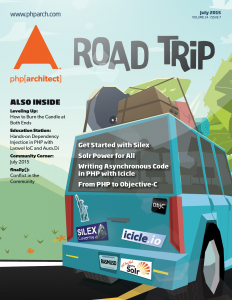Get Started with Silex
With the still-rising popularity of big frameworks like Symfony2, Zend Framework, and Laravel, there has been a movement in the other direction to create minimal, faster microframeworks. One of the many options available these days is Silex. Built on Symfony2 components and highly extendable, it is as minimal as can be. In this article, you will learn how to get started with Silex. by Stefan Koopmanschap
From PHP to Objective-C
I have been a PHP developer for over a decade. Although I love PHP, I recently became an Objective-C developer. This article compares and contrasts PHP and Objective-C. While I hope to provide a few breadcrumbs for those interested in the path to iOS or Mac development, I also hope to highlight a few Objective-C practices we can bring back to PHP. by Jason McCreary
Solr Power for All
If you’re storing, reading, or making use of text anywhere in your application, there’s a case for Apache’s Solr Search Server in your production stack. This powerful, Java-based enterprise search solution can provide meaningful information from your user’s comments and contributions. It can suggest term completions for user entry, offer typo-tolerant spell check validations to search queries, scale with your application’s data easily and resiliently, and find things in text, really, really fast… by Benjamin Greenaway
Writing Asynchronous Code in PHP with Icicle
Read this article for FREE
PHP is normally used to write synchronous code that is run on a per-request basis within a web server. However, PHP can also be used to create stand-alone long-running programs. These programs often need to handle many clients or tasks at once without blocking on a single task. Asynchronous operations allow many tasks to be performed cooperatively without blocking, but PHP does not immediately lend itself to asynchronous programming. Icicle is a library to facilitate writing asynchronous code using synchronous coding techniques to create asynchronous programs written using only PHP. by Aaron Piotrowski
Education Station: Hands-on Dependency Injection in PHP with Laravel IoC and Aura.Di
Welcome back to another edition of Education Station and to the second part of the series on Dependency Injection (DI) in PHP. The reason we’re looking at DI is because I want to help further its uptake in the PHP community, as well as dispel some of the myths surrounding it. In this month’s column, we’re moving on, looking at two more sophisticated DiCs: Laravel IoC and Aura.Di. by Matthew Setter
Leveling Up: How to Burn the Candle at Both Ends
If you’re a professional developer—and chances are, since you’re reading this article, you are—you’ve likely been given a deadline that felt unreasonable or a task that felt insurmountable, or a project that seemed like it was set up to fail from the start. I don’t think I’ve met any developer who hasn’t had this happen. If this doesn’t describe you, I’d like to meet you and learn about your place of employment. by David Stockton
Community Corner: July 2015
My company is expanding with a new branch in New York City, so that is where I’m writing from this month. Although I used to live here, it has been quite a while, so I was excited to check out the local tech scene to see how it had changed since I lived here. by Joe Devon
finally{}: Conflict in the Community
This is going to be a short column for me because I feel something needs to be said, but it’s not worth dwelling on it for too long. A few months ago, the PHP internals team was making final decisions on what features would or would not make it into PHP 7. To put it mildly, there was some heated debate around the subject. by Eli White





